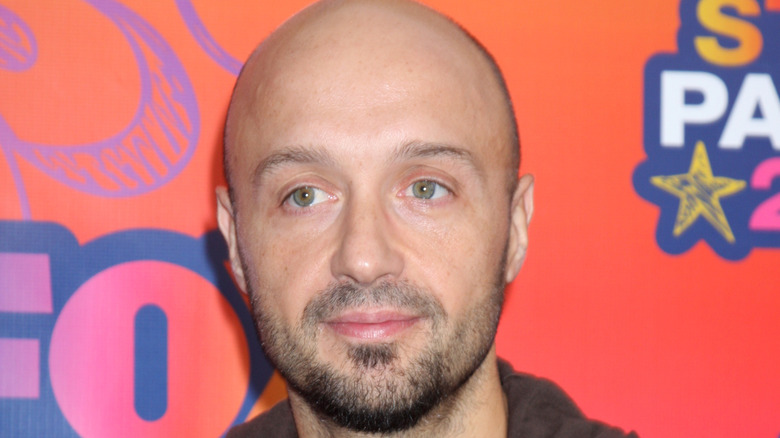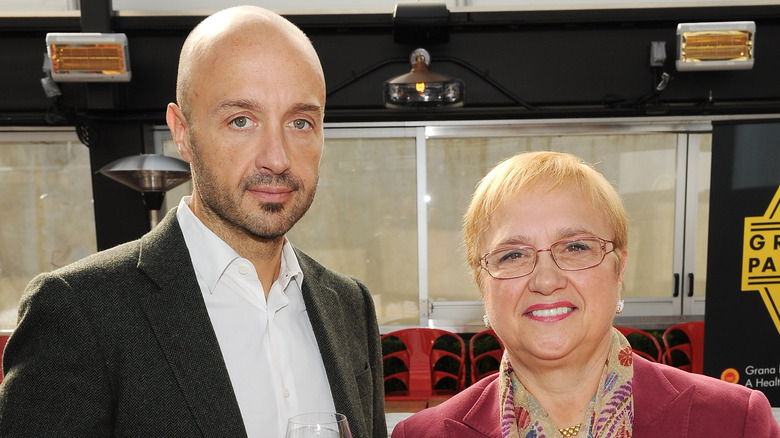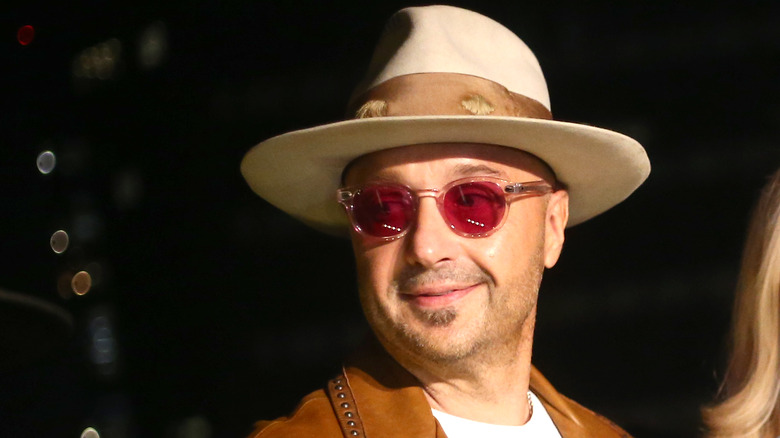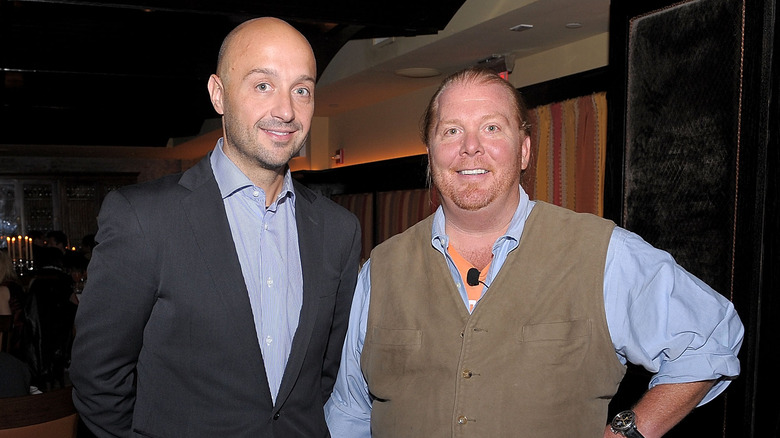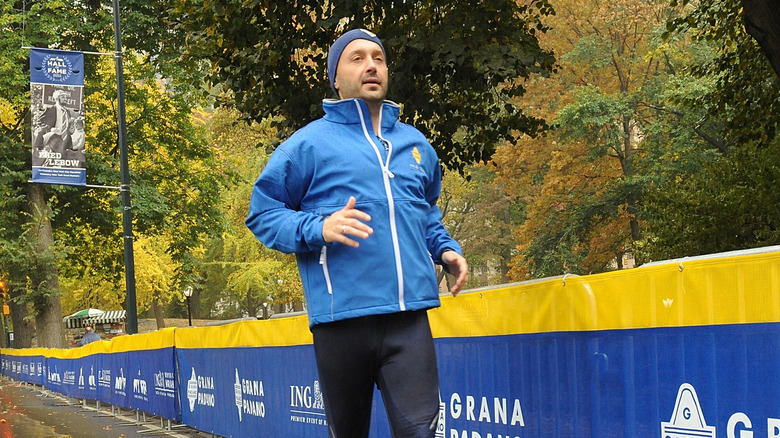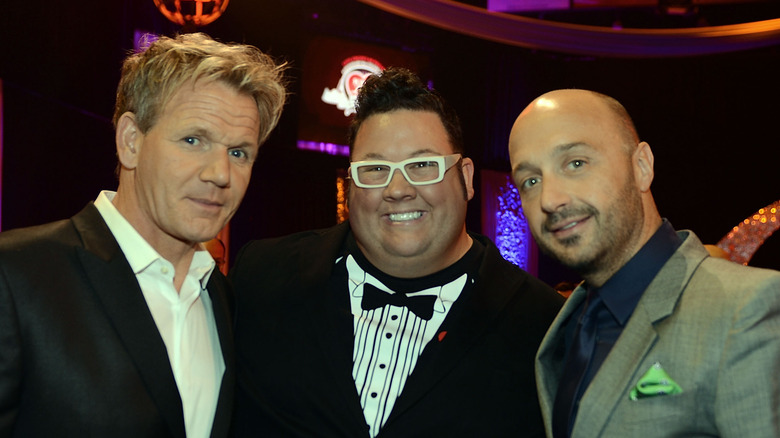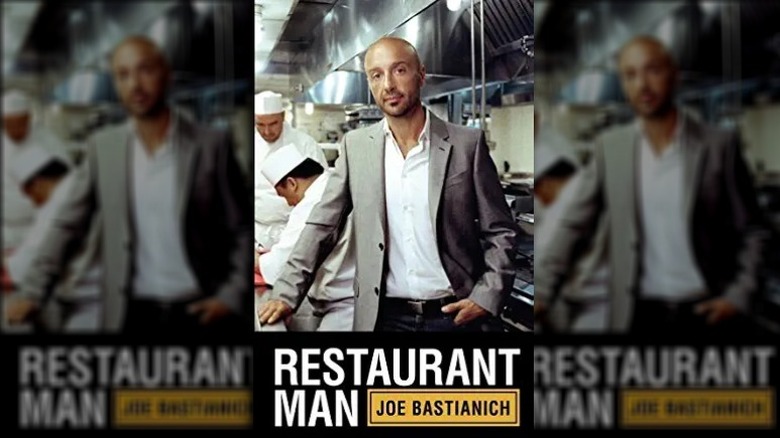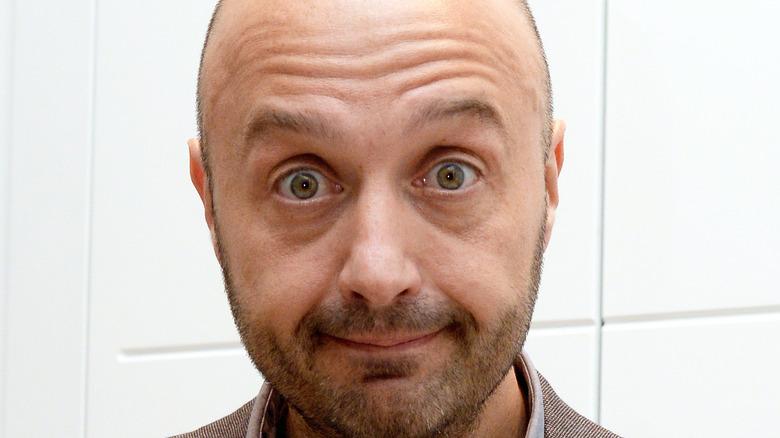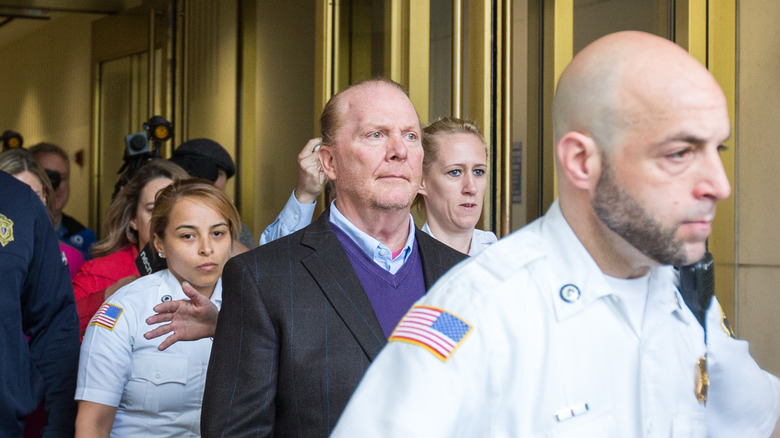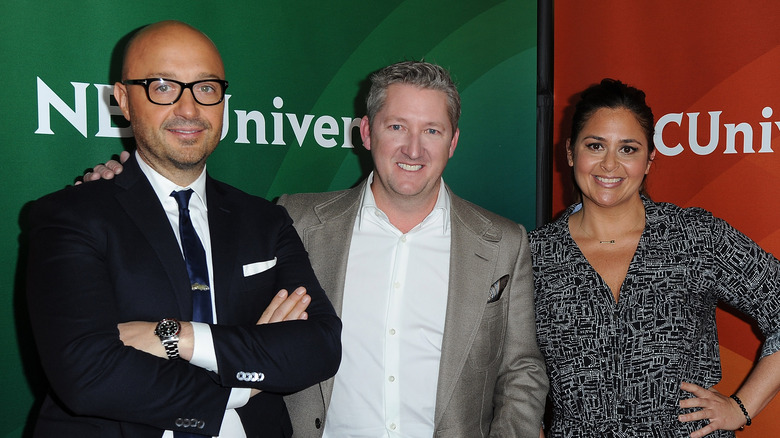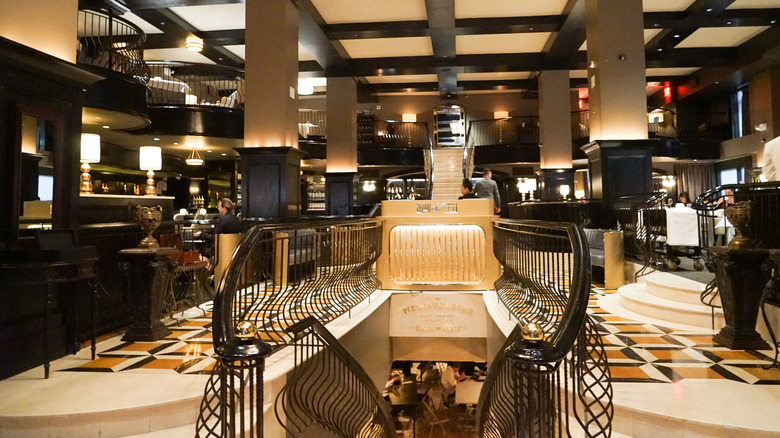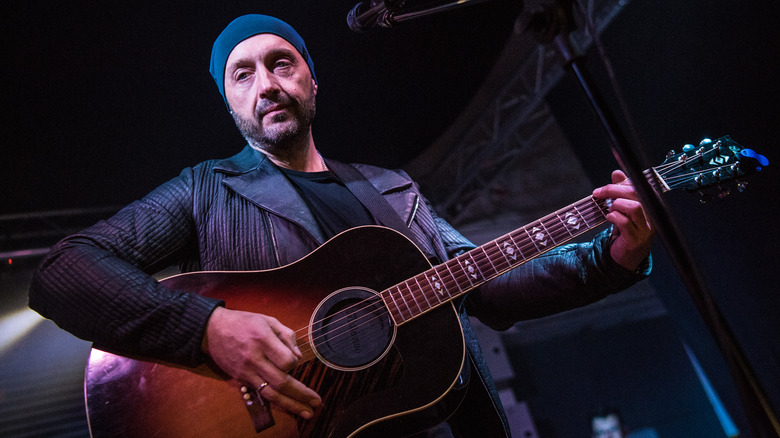Joe Bastianich's Transformation Is Seriously Turning Heads
Top restaurateur and television personality Joe Bastianich was born with an enviable culinary pedigree. His mother, Lidia Bastianich, opened her first New York City eatery when Joe was a child, later becoming an award-winning chef famous for her Northern Italian cuisine. And her husband, Joe's father, Felice, grew the business as her partner. Julia Child was a friend. Despite his connections, Joe Bastianich initially balked at following in their footsteps, pursuing a career in finance. In her book, "My American Dream: A Life of Love, Family, and Food," Lidia Bastianich even recalls her son feeling embarrassed by the smell of fish and produce in their family station wagon, a result of trips back and forth from the market to pick up supplies.
Soon enough, however, Joe realized a career in food was his true calling after all. He and his mother eventually partnered with celebrity chef Mario Batali to open several top-rated restaurants and Eataly, a franchise of high-end Italian food markets in some of the country's largest cities. Bastianich later survived professional scandal when the New York Attorney General opened an investigation into his restaurants in the wake of the #MeToo movement. And to this day, he still appears as a notoriously tough-to-please judge on the reality competition show "MasterChef." In the meantime, he's pursued his passion for music and fitness, while also growing his family. Clearly, there are many layers to Joe Bastianich, a fascinating figure who's transformed over and over through the years. Let's take a look.
One trip to Italy changed Joe Bastianich's mind about going into the family business
Growing up, Joe Bastianich showed little interest in the culinary world. Born in Astoria, Queens to parents who both worked in the restaurant business, he knew firsthand how financially insecure it could be. "This industry is rife with opportunities to bleed money — you have to watch every nickel," he once shared with Reuters. So he pursued a career in finance. "I went to work on Wall Street because that's what you did in 1989 if you wanted to be rich," he reflected in a 2013 interview with Business Insider. "And I wanted to be rich."
But he also desired fulfillment, which he wasn't finding watching stocks and crunching numbers all day. He quit his job and, at the suggestion of his mother, spent time in Italy immersed in the food, wine, culture, and countryside. Reinvigorated and recharged, he returned to New York and decided to finally give the family business a try. Together with his parents, he opened his first restaurant, Becco, in 1993, a midtown Manhattan Italian eatery that still welcomes customers to this day.
Friends set him up on a date with his wife, Deanna
Joe Bastianich is still married to his wife of over 26 years, Deanna. Per their New York Times wedding announcement, they tied the knot in 1995 after meeting through friends, then moving in together just three weeks later. And yes, his mother did most of the cooking for their reception. Apparently, before meeting her husband, Deanna hadn't been much of a foodie, having "subsisted primarily on yogurt, popcorn, bagels and cereal." By the time she married Bastianich, enormous Italian weekend feasts prepared by his family had become the norm.
In the years since, they have welcomed three children: Miles, Olivia, and Ethan. And while Bastianich doesn't publicly share much about his brood, he does occasionally post about them on his social media to wish them happy birthday or hail their major life accomplishments, like completing college. In 2013, Bastianich told the New York Daily News their interest in the family business remained to be seen. "My kids are immersed in the food and wine world. I don't really shove it down their throats, but to the extent they want to participate in it, it's always around them."
Joe Bastianich met future business partner Mario Batali at an awards dinner
It was his "matchmaking Italian yenta of a mother," Joe Bastianich wrote in his 2012 book, "Restaurant Man," who introduced him to a figure who would change the course of his career: Mario Batali. Batali, already a promising chef and restaurant owner, and Joe were brought in by Lidia Bastianich to help with the James Beard Foundation Journalism Awards dinner. From the moment they met, they not only became fast friends, they quickly decided to go into business together. As Bastianich recalled, they spotted a "for rent" sign while carousing one night and impulsively snapped the space up. It later became the location for their Michelin-rated restaurant, Babbo.
In addition to Babbo, Bastianich & Batali Hospitality Group also opened the renowned Del Posto in New York, as well as several other highly-reviewed restaurants in Manhattan, Las Vegas, and other cities nationwide. In 2010, they also partnered with Lidia Bastianich to open the first U.S. location of Eataly, a large-scale, high-end marketplace made up of both Italian restaurants and produce shops. After launching in New York City, Eataly locations popped up all over the country in the coming years. "We don't want you to just come and eat and walk away," Batali explained of the concept. "We want you to come and taste some things and then take them home and cook them."
A 2006 health scare turned him into an athlete
These days, it's easy to see that Joe Bastianich is in great shape. But that wasn't always the case. By his own account, Bastianich used to be 60 pounds overweight and suffering from sleep apnea as a result. In 2006, he recalled being told by a doctor that both his cholesterol levels and blood pressure were dangerously high. The news worried him enough that he decided, on the spot, to lose the weight once and for all. At first, it wasn't easy. "I come from a family that loves to eat, not exercise," he told Runner's World. "Being fat made even walking hard." At first, just a few minutes walking on a treadmill left him winded. Gradually, his stamina improved. "I walked one mile, then two, then three. Then I began to pick up the pace and started running."
Just four years later, Bastianich was not only significantly slimmer, but he was running marathons. In 2011, he completed an Ironman World Championship. Of his family's reaction to his newfound fitness, Bastianich told Epicurious: "They're incredulous." The key to everything, he added, was re-examining his approach to eating. "When I stopped looking at food as a reward or a celebration and began looking at food as energy to fuel my athletic ambitions, that really kind of changed the whole world for me," he says. "That was the real aha! Moment."
MasterChef instantly gave Joe Bastianich national recognition
Thanks to the success of his restaurants, there's no question Joe Bastianich was a player in the culinary world. But he gained national recognition the minute the Fox cooking reality competition show, "MasterChef," — the American version of the British series — hit screens in 2010. As one of the show's original judges, Bastianich's straight-shooting feedback quickly earned him comparisons to "American Idol" bad guy Simon Cowell. How scathing can his feedback be? Next to him, normally hot-tempered chef Gordon Ramsay, also a judge, almost looks like a softie.
Bastianich admitted his honesty could be brutal, but said it came from the best of intentions. "I take cooking and the show very seriously, and I think my attitude reflects that," he told Real Style Network. "Some say I am too harsh, but I'm not going to apologize for having high standards for what should make up our country's best home cook. I don't think doing anyone any favors will help to keep that title elevated to where it should be." In 2013, "MasterChef Junior," which features contestants ages 8-13, debuted. As a judge on that series, Bastianich remains equally no-nonsense, telling Parade: "I treat these kids like I would cooks in my kitchen."
His father's illness inspired him to write a book
In 2010, the year Joe Bastianich turned 40, his father, Felice, fell ill, passing away later that year. To cope with his emotions, Bastianich started writing the book that later became his 2012 memoir "Restaurant Man." In the tome, he pulled no punches recounting his experiences in the New York food scene, which reportedly offended everyone from an Esquire food writer to the owner of Manhattan hotspot Le Cirque for their unflattering portrayals. "I didn't see the point in writing a fluff book," Bastianich stated. "If I was going to do it, it was going to be like me, completely honest."
Rather than a gossipy tell-all, however, he maintained the book was actually an homage to both his parents, telling the Milwaukee Journal Sentinel it was "an unabridged story of what happened in my life, the good, bad and ugly. I think if you read the book you can understand what has made me, the son of an immigrant. People who left everything behind and worked hard, a sense of frugality and respect of earning money." He drove this point further home while speaking to Bon Appetit, explaining that his father "was very sick when I started writing the book, and I just felt that story needed to be told."
A new TV project prompted his surprising departure from the show that made him famous
In 2014, Bastianich exited both "MasterChef" and "MasterChef Junior." New York Magazine's Eater speculated it was in order to spend more time working on his new CNBC show, "Restaurant Startup." Rather than critique contestants on the food alone, Forbes explained that "Restaurant StartUp" was also about demonstrating the vision and savvy needed to run an actual place of business. The winner would ultimately receive a real-life financial investment from Bastianich, an executive producer and one of the show's three judges. It aired for three seasons before being canceled.
However, Bastianich did not abandon the "MasterChef" world entirely. He remained a judge on "MasterChef Italy." And, as he departed the American franchise, he had only kind things to say. He told E! News that while he did want to focus on other television opportunities, "I had a great experience. It was a show that changed my life." (As it turns out, it was a pretty smart move for Bastianich to leave on good terms. More on that in a minute.)
Shocking accusations forced Joe Bastianich's professional split from Mario Batali
The #MeToo movement, which brought to light many sexual workplace abuses committed by powerful men, hit home for Joe Bastianich with a report from New York Magazine's Eater that was published on December 22, 2017. In it, multiple employees accused Bastianich's business partner, Mario Batali, of inappropriate behavior in their restaurants that included physical groping. Batali swiftly apologized for his past behavior and stepped away from both the day-to-day running of his businesses and his media commitments.
Bastianich issued his own statement, acknowledging there was more he could have done to stop Batali. "I'm proud of what our teams accomplish every day, and I've always tried to show respect for them and their work," his statement read. "I'm re-examining my own behavior to ensure that everyone I work with feels that respect." Two years later, with Batali facing criminal charges for some of his alleged conduct, Bastianich and his mother formally cut business ties with him altogether, going as far as removing Batali's products from Eataly. According to Vox, the Bastianichs also beefed up their human resource department and installed an employee hotline for reporting harassment. In 2021, following an investigation by the New York Attorney General, and Batali agreed to pay $600,000 to a group of female employees who claimed they had been sexually harassed while on the job.
Joe Bastianchi made a national comeback by returning to MasterChef
In the aftermath of the Mario Batali scandal, Joe Bastianich seemed to keep a low public profile. But he resurfaced in 2018 by returning to "MasterChef," which welcomed him back. (See what we meant about leaving on good terms?) To the delight of fans and viewers, he resumed his role as a full-time judge on Season 8 and has remained on the show ever since. In terms of his no-holds-barred approach to criticism, let's just say he didn't miss a beat. For their part, most of the contestants appear to respect it. Season 11 winner Kelsey Murphy commented, "I think that most people would agree that Joe is very hard to please. He is very critical." But when she did win his praise, she felt "accomplished and pleased," noting that while Bastianich is "not very forthcoming with his positive comments," his rare positive reviews are worn "like a "badge of honor."
Viewers also seem to feel his years of experience add to the show's credibility. "You do not need to be a chef to be a successful restaurateur," one Redditor opined. "He clearly has to know food and what people like." Another concurred, posting: "He represents a big element of what makes chefs successful: whether or not their dish will actually sell in a restaurant."
The Covid pandemic caused two of his restaurants to go out of business
Covid-19 caused the permanent closure of countless restaurants in New York City, including two of Joe Bastianich's. Del Posto, his upscale Italian eatery that won a four-star review from the New York Times in 2010, finally shuttered its doors after 15 years. But there was a silver lining. Bastianich and his mother sold the space to a group that included Del Posto's longtime general manager, Jeff Katz, and executive chef Melissa J. Rodriguez. "Jeff and Melissa were the driving force behind the success and evolution of Del Posto," Bastianich said in a statement to the New York Times. "I am happy and proud that they will continue that evolution into the future."
Another Bastianich restaurant, Otto, famous for its pizza, had already closed as well, having temporarily opened for take-out during the pandemic, before closing its doors for good. At the time, Bastianich did not downplay the ruinous effect Covid-19 was having on the entire industry, telling Italian online food website Identita Golose: "My restaurants in New York are all closed. Or rather: in two restaurants we've placed a few tables outside, but it's very little, and on top of that here it rains almost every day. The other 15 are closed. Most of all: there's no opening date, we know nothing, and we can't make plans. It's a devastating situation." Felidia, Lidia Bastianich's renowned Italian restaurant, later closed for good in the fall of 2021.
A guitar bought by his grandmother first ignited his passion for music
Even just a quick peek at Joe Bastianich's Instagram makes it abundantly clear that, in addition to food, he is also devoted to music — it's even in his bio. It all started, he has said, with a gift from his grandmother, who bought him his first guitar. He's been writing songs and performing live ever since, regularly jamming onstage in New York City. He has said that it's music — as opposed to cooking or his restaurants — that reflects him the most. "When you're writing music you really have to be introspective and you have to let your real emotions come out," he reflected. "The music best represents who I am as a person more than anything else."
Recently, as the country slowly emerged from lockdown, he penned a song called, "One City Man," which he says encompasses both the pain and anger caused by the pandemic as well as a sense of hopefulness as people attempt to rebuild and recover. It's also a love letter to his Manhattan hometown. Describing his writing process, he told La Voce di New York, "Through that period, I was writing in the subways, going to Central Park, or walking on the High Line alone. There was the emotional part and then the confidence in New York City. Never bet against New York City. New York City will be back and that's the song."
